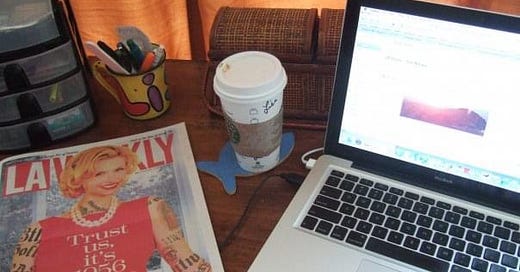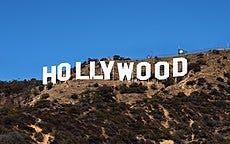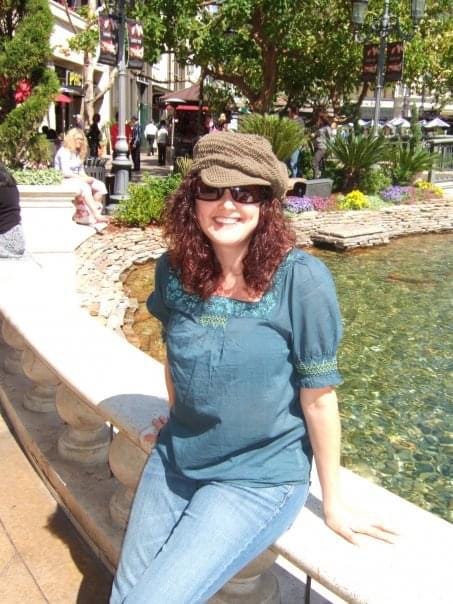A few days after landing in Los Angeles, in January 2007, I drove myself in a hastily-purchased beat-up white Ford Taurus to a screenwriting class, in Santa Monica.
I’d signed up for the course ahead of my trip after finding them online. It was a complete leap of faith, as was my ability to drive myself anywhere unaccompanied. Fortunately, both ultimately worked out very well.
I liked the sound of the place and had spoken to a very congenial chap on the phone 6,000 miles away from where I was sitting in north London. Revealing himself to be intruiged by my English accent (this was to be my new normal), he assured me they didn’t bite and that I’d learn a few things along the way.
I duly paid the deposit. I figured that as I only knew one other person in LA (an old school friend who was a teacher), I needed to find ‘my people’ as soon as humanly possible. This was my shortcut. On the course, I would meet other writers and industry people, and plug into their world.
But before we go on, let me rewind slightly and put all of this into some context. After more than ten years working as a journalist in London, where I rose through the ranks of teen mags and women’s mags, before launching Now magazine as showbiz editor, then moving to the Mirror’s TV mag as a commissioning editor, I was ready for a change.
At that point, a couple of my feature-length scripts had been optioned. I’d signed with the William Morris agency, then an independent agent, and completed a short spell story-lining at Coronation Street. I was performing stand-up comedy in and around London, and appeared at the Edinburgh Fringe Festival, in August 2006, performing both stand-up and improv.
All of the above had made me a better writer but I wanted to focus on screenwriting and it seemed only natural that Hollywood was the place to do that. Movies have always fascinated me so this was a dream transition. But how?
I was freelancing for Media Guardian (and other national titles), and so I approached their then film editor (now turned author), Xan Brooks, about sponsoring my first visa.
I pitched a weekly film blog, an LA Diary, charting my attempts to ‘make it’ as a film-maker in Hollywood, which miraculously he seemed to like. The column eventually ran for two years and covered my experiences as a writer, producer and director, which found another gear when I won a short film competition just three months after arriving in California.
It was a fledgling blog on a national newspaper platform which was just figuring out how to do the online thing - but it got me to LA, and I’m forever grateful. It’s hard to describe how 17 years ago blogs, and any other kind of first-person online presence, were still so relatively new, and in many ways groundbreaking. Instagram wasn’t a thing, MySpace was where it was at, and Facebook was full of people poking each other for laughs.
As well as the Guardian, whilst in LA, I also freelanced for magazines such as Marie Claire, Grazia and Red, and interviewed A-listers for the cover of The Scotsman’s weekend mag, and the Herald Sun’s glossy Sunday magazine, in Australia.
I’d landed at LAX with a Nokia phone that didn’t have coverage in the US, and had to use the phone box in the arrivals hall to call my mate to pick me up. I remember buying a Starbucks coffee so I’d have coins to use, and jet-lagged to the hilt, spent far too long staring at this mysterious shiny silver box with buttons trying to work out what to press and when.
Less than a week later, having purchased a second-hand Ford Taurus with dodgy a/c, and with a physical map in hand (this was 2007 not 1807 but my goodness it seems so different to now), I set off from my tiny back house rental in Mar Vista, on the west side of LA, to attend my first industry event.
It was maybe a 15-minute journey and I didn’t cock it up or bash into anyone. Huge relief. What I do remember is sitting in my car in the parking lot wondering what the hell I’d just done to my life.
Thrown a bomb into the middle of it, that’s what.
Everything was so different.
Sitting stock still in the driver’s seat, I watched reams of sun-kissed people arrive and stroll into the building as if it was all so natural, and not at all as if they’d just landed on another planet.
Eventually, with the clock ticking, I spoke out loud to rally myself: “Lisa, it took a lot of work and effort to get here. You might as well go in. Get out of the car and walk inside.”
So I did. I walked.
And I never looked back.
I smiled and said hi to a couple of people and they said hi back. Excellent start.
Then, I found a seat somewhere in the middle of the room but not too near the front and waited for Nancy Meyers, writer/director of The Holiday, As Good as it Gets, and It’s Complicated, to arrive. She also wrote the screenplay for Private Benjamin, winning the Best Screenplay Oscar in 1981, along with co-writers Charles Shyer and Harvey Miller, and was here to talk about her career.
A guy sat down next to me, to my right. His name is JD and we’re still in touch. On my left, I said hello to a girl called Julia who, after the panel, invited me to join her writers group in Hollywood. I said yes. My philosophy at this stage was to say yes to everything. This was my first solid yes.
Nancy was congenial, entertaining and informative. I think. I’m not sure I was completely listening because for most of the time I was sitting there screaming inwardly: THIS IS MY LIFE NOW.
What I do remember is driving home and feeling proud of lil ole me for pushing so far out of my comfort zone. At that point, an anaesthetic wouldn’t have gone amiss. But I hadn’t embarrassed myself and actually - hold on - I’d rather enjoyed the evening. Everyone was extraordinarily welcoming to the lone Londoner who wanted to write movies.
Their enthusiasm was a refreshing change to this sardonic, wrong-side-of-30 journalist, who was feeling a little world-weary. I may have been a novelty to them but when I shared my writing goals everyone around me transformed into an instant cheerleader. There was a real sense of ‘you can do this’ and not the raised eyebrow ‘who do you think you are?’ response I’d had from some back home.
That’s why I will never tread on anyone’s dreams. You simply don’t have the right. Shout out to my sixth-form college careers officer, who told me I should be a secretary as that’s all I was good for. (Way to go to crap all over a 17-year-old’s ambition, you miserable bastard).
Got a dream? Go for it. Just don’t expect it to be easy.
Additionally, as it turned out, The Guardian had good name recognition in the city which got me story leads and into many wonderful events. I relaxed a little as it dawned on me that being a British wannabe screenwriter/journalist, in California, could potentially be a lot of fun.
A week later, I drove back to the same parking lot for my first official screenwriting class, which was only one millionth less intimidating than the first time but at least I knew where I was going.
This was not so much a writers group but a group of writers meeting to sharpen the tools in their toolbox. The class was an eclectic mix of newbies to the business, plus people like me who’d had agents or optioned scripts but not quite made that leap into it being their full-time job, and experienced writers, who were working in the industry and wanted to hone their craft.
Rob Lowe’s brother Chad was there working on something or another, as were TV writers Ed Crasnick and Chuck Sklar, who was then on the writing staff of the sitcom Everyone Hates Chris.
There was also a lovely lady, whose name escapes me, who I remember was writing a script about Anna May Wong, Hollywood’s first Chinese/American superstar actress. It sounded great and I was convinced her script would be made one day. I don’t think it has been, although maybe somebody can put me right on that.
Immediately, being around these creative types put me at ease. Those silly questions that I’d been wary of asking anyone else - discussions about scene structure that would bore non-writers to death, the pros and cons of character bios, etc - were no longer conversations to hide.
The course proved to be useful but really, I found that being accountable, and having to log our hours, and produce a certain amount of pages every week for class, was invaluable. I was energised.
At the time, I was working on a feature-length script about a comedy double act, one of which had gone on to huge solo mainstream success, and how it affected their lives and relationship, and another which I can only describe as dating and time travel.
Time travel, I have decided, is impossible to write. At least, for me. I got myself into a big pickle writing that one (even though the concept was good), so hats off to anyone who manages to do it well! Bob Zemeckis I am not.
Julia, the girl I’d met at the Nancy Meyers event, got in touch via text. To paraphrase, it went something like this:
“Lisa! Join my writers group. We meet every week at the Billy Wilder Library, at the Writer’s Guild of America, in Hollywood. Near the Grove. Lots of parking. We all bring snacks. I think you’d fit right in!”
Sorry, what now? Billy Wilder? Film-making genius, Billy Wilder? Some Like it Hot Billy Wilder? At the offices of the WGA? The home of the scriptwriter? Near The Grove shopping mall? With all its fountains and lights and incredible food outlets. Yes, please!
And so, on another balmy night, a couple of weeks later, me and the Ford Taurus, drove a long, long, long way up Venice Boulevard, then turned left onto Fairfax (because I didn’t do freeways at that point), through the ‘burbs and Little Ethiopia, until I got to Hollywood and the WGA West.
And there, I joined my first legit writers group. I was thrilled.
After being lead into an inner sanctum, walking by tons of movie memorabilia and leather-bound scripts galore, I sat down at a large table and was introduced to the others. There must have been eight or nine of us but all I truly remember is Margot.
Margot has since gone on to become a great friend but in this moment, she was heavily pregnant and laying out snacks as far as the eye could see. She’d covered all bases. There were chips (crisps), dips, hummus, cold meats, cheese, crackers, fruit platters and chocolate.
I thought to myself: “I like this woman. I like her a lot.”
Also, she was funny as all hell. Margot had sold a ton of scripts, made deals, worked on pilots, and been a hugely successful touring comedian. Her stuff made me crack up.
She could translate her funny on to a page with just the right amount of pathos. I found out later that her long-time writing partner had passed away just as she about to give birth to her first child. She was in an unusual place in her life - both grieving and excited to become a new mom.
She had a heart of gold and - phew! - she found me funny. In fact, we were the funniest by far in that room, and we knew it. We become instant friends and still are. We’ve shared so much over the last 17 years, and I love her to bits.
Not everyone was trying to be funny. I enjoyed listening to everyone’s writing, which spanned different genres and forms. And I also enjoyed sharing mine. Well, ‘enjoyed’ might be the wrong word. You’re always on tenterhooks but it’s okay once you get over the first hump of nerves.
We’d assign our characters to a different person in the room and then we’d read the pages. I’m a pretty lousy actress but as this was Hollywood there was some real acting talent in the room. Suddenly, characters that read well on a page would fill out and become three-dimensional human beings full of colour and life.
Once you can see that people are started to get invested in your characters and stories, it becomes exciting, and that excitement lifts your writing to another level.
Sharing your work, and reading it out loud, means that you can hear that the monologue you slaved over for a month is two minutes longer than it should be (that’s a bloody long time in any movie), or that you’ve written really clunky dialogue, or - happy days - that you’ve written gorgeous, sparkling dialogue that dances across the page. You hear everything from the mis-steps to the dramatic/comedic highs.
Just remember, other people’s input can be helpful just as long as it’s critique and not flat out criticism.
Also, you don’t have to take it onboard. Everyone has an opinion and you can completely ignore all of them. But getting the perspective of other writers can be extremely useful.
Mostly, there’s an accountability to showing up regularly with new pages to share. You have to get it done, otherwise why bother? And by doing that you can slowly make your way through your story. It’s a steady engine for your writing.
Instantly, I liked the way that a writers group made me feel, and what it made me do. Being part of it meant I had to write.
And I needed structure. Being new to California meant I had all sorts of distractions. There was the ocean, the mountains, the hiking in the hills, the screenings, the industry events, the studios, the coffee shops, the pedicure salons, the bike rides along the beach, the bars, the giant breakfasts, the taco stands, the Korean spa. I could go on and on. But between my course, and Julia’s group at the Billy Wilder Library, I was getting pages written. Lots of them. I was probably writing for 20 or more hours a week.
And I never stopped.
What I also remember clearly about that first evening at the WGA was getting into my car and it not starting. Oh boy.
I was in an underground parking lot at 10.30pm, miles from home, wondering what to do.
I saw Margot waddle (sorry Margot!) to her car carrying her scripts and snack bags. She waved over at me. “Everything okay?”
“Absolutely fine!” I yelled back.
“See you next week, then” she replied, before hoiking herself into her SUV.
“Can’t wait!” I shouted, smiling.
I watched her drive off, still waving and smiling enthusiastically. There was no way I was going to bother a heavily pregnant lady with my car problems so late at night.
The parking lot was suddenly very dark and empty but it was okay. I’m not one to panic.
I found the building’s security guard and told him what was going on so that he wouldn’t lock the gates to the car park. Then I called AAA (that’s like the AA and RAC in the UK). Thankfully, I was already a member - mostly for the freebies and discounts - so had all the details I needed on me.
I waited for the truck to arrive.
Sitting there, I weighed up this strange situation.
Okay, I had a car that wouldn’t start but it was a car that wouldn’t start in the parking lot of the Writer’s Guild, where I’d been at my first writers group.
THIS IS MY LIFE NOW.
The supposed glamour quotient of a life in Hollywood was at absolutely zero in this moment but I didn’t care. Within a month of arriving in LA, I’d already found my people. The ancient Taurus would have to go but they were here to stay.
This was going to be an adventure like no other.
Lisa
Next week: In part 2, I win a film competition and start my own writers group.








"when I shared my writing goals everyone around me transformed into an instant cheerleader. There was a real sense of ‘you can do this’ and not the raised eyebrow ‘who do you think you are?’ response I’d had from some back home." That's what I love about Americans. I stopped sharing my goals with English people (apart from in writers' groups) ages ago because they often try to piut such a dampener on ambition. Huge generalisation I know, but that's been my experience.